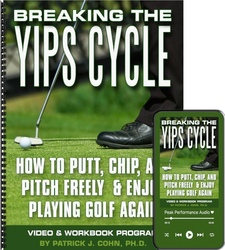
Why Golfers Turn Bogeys into More Bogeys
“Mistakes happen.” “Mistakes are a fact of life.” “We all make mistakes.”
Most people generally accept these common sayings as true… except if you’re a golfer!
How many times has your play spiraled downward during a golf game after you made a mistake?
Why does your golf game suffer after a mistake when you know: “Mistakes happen,” “Mistakes are a fact of life,” and “We all make mistakes”?
How to recover from making a bogey or two is a common question that pops up on our golf surveys.
One golfer, who wants help with this issue, wrote about how one mistake can completely ruin his round of golf.
“How do I stop myself from unraveling after a mistake or bad hole? Somehow, it always seems to happen. I’m playing a great round then one bad bounce, one bad shot, one bad hole on the back nine and it ruins the rest of the round. I want to learn how to get back on track after a bad hole.”
Getting off the bogey train has nothing to with technique, a mistake or the bad shot itself.
It’s your thoughts about what happened and your expectations of what is going to happen after the mistake!
Statements such as “unraveling after a bad hole always seems to happen… it ruins the rest of the round” are a self-fulfilling prophecy. It gives you no other way to respond. You already believe you are going to unravel.
Your beliefs or assumptions affect emotions and produce a physiological stress response within your body.
As your thoughts spiral out of control, your emotions run wild, and your physiology is altered, it’s no wonder that your performance suffers and unravels.
Being in command of his thoughts was Nick Taylor’s key to victory at the 2020 AT&T Pebble Beach Pro-AM.
Taylor started the final round with a one-stroke lead and faced some challenges during the final round. For one, Taylor was paired with Phil Mickelson, winner of five Major Championships. Even though the wind picked up, Taylor kept his mind clear to win the tournament by 4-strokes.
There were definitely challenges to be met and distractions to overcome as
Taylor stated after the third round.
TAYLOR: “I’ve just got to do my own thing and try to block all that out.”
Taylor admitted that winning wasn’t easy but he was in charge of his thoughts rather than letting his thoughts control him.
TAYLOR: “Yeah, it was really, really difficult. The wind picked up kind of the end of that front nine, and I was hanging on there, and a few poor drives that I didn’t think were too bad but ended up in bad spots and just tried to manage my way from there. And 14’s such a difficult hole, once I made double there I had to settle myself down and know that I still had a two-shot lead. And then obviously, chip-in the next hole and get one shot back was massive.”
If unraveling after a mistake is initiated by your thoughts, you can also direct your thoughts to enhance your golf game. The key is to stop buying into the false assumptions and false generalizations that pop up in your mind.
Getting Off the Bogey Train Mindset
Conscious Debate – You can alter the message in your mind by quickly challenging your expectations about how you are playing or scoring.
For example, “Is it always true that one bogey will turn into several?” No, unless you buy into this self-fulfilling prophecy.
One bogey doesn’t have to turn into another bogey–unless you make it so. You have to control yourself (emotions) before you can control your golf game!
Related Golf Psychology Articles
- 3 Steps to Getting Off the Bogey Train
- How Scheffler Maintains Composure
- How Golfers Can Play More Consistently
- Subscribe to The Golf Psychology Podcast on iTunes
- Subscribe to The Golf Psychology Podcast on Spotify
Discover How to Break the Yips Cycle

know you are frustrated with your putting, chipping, or pitching and have considered giving up the game you once loved to play. But before you make that decision, read what I have to say about how I help golfers overcome the yips….
The first place to begin to break the Yips Cycle is to admit that the yips are a mental issue. Stabbing or flinching at impact are symptoms of bigger issues: fear and over control. Changing your grip, putter, swing, club, or routine are only temporary Band-Aids to a mental game issue.
“Breaking The Yips Cycle” is a complete brain dump of the TOP NINE mental training sessions I do with my personal coaching students to help them overcome the yips and play with freedom again!